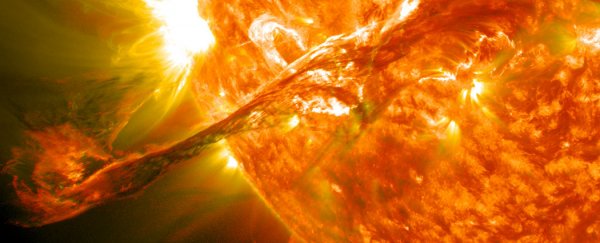Earlier this week, we wrote about a presentation given by mathematics professor Valentina Zharkova from Northumbria University in the UK at the annual National Astronomy Meeting in Wales, in which she compared three solar cycles 15 years in the future to the Maunder Minimum - a 'mini ice age' that plunged the northern hemisphere into a series of bitterly cold winters between 1645 and 1715.
While Zharkova and her team maintain that things will be extra chilly during this period of decreased solar activity, others are not so convinced, because believe it or not, humans actually have a bigger impact on Earth's climate than the Sun does.
"While changes in the Sun's activity have a very marginal effect on global warming and/or cooling, human contributions to carbon dioxide in our atmosphere completely overwhelm the Sun's influence," US astronomer Phil Plait says over at Slate. "It's like tapping on your brakes as your car plunges headlong into a brick wall at 100 kilometres per hour."
The reason behind Zharkova's claim of lowered temperatures, beginning around 2030, was that her team's new solar cycle model predicted that there would be a 60 percent drop in magnetic energy from the Sun. Looking at the magnetic wave patterns predicted by their model, the team predicted that there would be fewer sunspots over the next two solar cycles: Cycle 25, which peaks in 2022, and Cycle 26, which runs from 2030 to 2040. This indicates less solar magnetic energy during that time.
"In Cycle 26, the two waves exactly mirror each other - peaking at the same time but in opposite hemispheres of the Sun," Zharkova said at the conference. "Their interaction will be disruptive, or they will nearly cancel each other. We predict that this will lead to the properties of a 'Maunder Minimum'."
The problem with this prediction, says Plait, and in comparing what's about to happen with the 17th century Maunder Minimum, is that a drop in the magnetic activity of the Sun will only have a marginal effect on its light/heat output. He explains at Slate:
"There has been research asking what would happen if it is weak next time and concludes it will have moderate localised effects - not global cooling. In fact, the very first line of the abstract of that paper is this: 'Any reduction in global mean near-surface temperature due to a future decline in solar activity is likely to be a small fraction of projected anthropogenic warming.'"
We're yet to see the published results from Zharkova and her team, but until then, Plait urges that claims like this do not distract us from what's really coming, low magnetic solar energy or not. "Don't be fooled," he says. "Global warming is real, and we're headed, literally, for a world of trouble."
